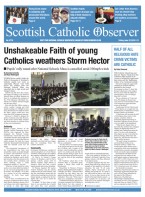October 19 | ![]() 0 COMMENTS
0 COMMENTS ![]() print
print

Pride in subtle forms
Fr Ronald Rolheiser
One of the wonderful features of young children is their emotional honesty. They do not hide their feeling or wants. They have no subtlety. When they want something they simply demand it. They holler. They cry. They snatch things from each other. And they aren’t ashamed of any of this. They offer no apologies for selfishness, no disguises.
As we grow-up we become emotionally more-disciplined and leave most of this behind. But we also become much less emotionally honest. Our selfishness and our faults become less crass, but, this side of eternity, they never really disappear. They just become subtler.
The church has, classically, named something it calls the ‘seven deadly sins’: pride, envy, wrath, sloth, greed, gluttony, and lust. How these manifest themselves in their most crass forms is evident. But how do these manifest themselves in their subtler forms? How do they manifest themselves among the supposedly mature? Great spiritual writers have always had various treatises, some more astute than others, on what they call the religious faults of those who are beyond initial conversion? And it is valuable sometimes to look at ourselves with naked honesty and ask ourselves how we have morphed the more crass faults of children into the subtler faults of adults. How, for instance, does pride manifest itself in our lives in more subtle ways?
How pride lives in us during our more mature years is probably best described by Jesus in the famous parable of the Pharisee and Publican. The Pharisee, vilified in this story, is proud precisely of his spiritual and human maturity. That is a subtle pride of which it is almost impossible to rid ourselves. As we mature morally and religiously it becomes almost impossible not to compare ourselves with others who are struggling and to not feel both a certain smugness, that we are not like them, and a certain disdain for their condition. Spiritual writers often describe the fault in this way: Pride in the mature person takes the form of refusing to be small before God and refusing to recognise properly our interconnection with others. It is a refusal to accept our own poverty, namely, to recognise that we are standing before God and others with empty hands and that all we have and have achieved has come our way by grace more so than by our own efforts.
During our adult years pride often disguises itself as a humility, which is a strategy for further enhancement. It takes Jesus’ invitation to heart: Whoever wants to be first must be last and be the servant of all! Then, as we are taking the last place and being of service, we cannot help but feel very good about ourselves and nurse the secret knowledge that our humility is in fact a superiority and something for which we will later be recognised and admired.
As well, as we mature, pride will take on this noble face: We will begin to do the right things for seemingly the right reasons, though often deceiving ourselves because, in the end, we will still be doing them in service to our own pride. Our motivation for generosity is often more inspired by the desire to feel good about ourselves than by real love of others. For example, a number of times during my years of ministry, I have been tempted to move to the inner city to live among the poor as a sign of my commitment to social justice. It took a good spiritual director to point out to me that, at least in my case, such a move there would, no doubt, do a lot more for me than for the poor. My moving there would make me feel good, enhance my status among my colleagues, and be a wonderful inscription inside my curriculum vitae, but would not, unless I would more radically change my life and ministry, do much for the poor. Ultimately, it would serve my pride more than it would serve the poor.
Ruth Burrows cautions that this same dynamic holds in terms of our motivation for prayer and generosity. Thus, she writes: “The way we worry about spiritual failure, the inability to pray, distractions, ugly thoughts and temptations we cannot get rid of… it is not because God is defrauded, for he is not, it is because we are not so beautiful as we would like to be.”
And subtle pride, invariably, brings with it a condescending judgment about others. We see this most strongly perhaps in the period shortly after first conversion; when young lovers, recent religious converts, and neophytes in service and justice, still caught-up in the emotional fervour of the honeymoon, think they alone know how to relate to each other, to Jesus, and to the poor. The fervour is admirable, but the pride invariably spawns a couple of nasty children, arrogance and elitism.
Pride is inextricably linked to our nature and partly it is healthy, but it’s a life-long moral struggle to keep it healthy.











